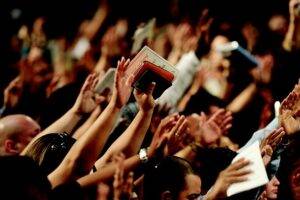Explore the beauty and significance of communion as a sacred ordinance instituted by Christ, fostering spiritual nourishment, union with Him, and fellowship with fellow believers.
Warm greetings to the ChurchJunction.com community! Today, we’re going to explore the beauty and significance of communion, a sacred ordinance instituted by Jesus Christ before His death. As we gather around this table, we’re reminded of the Last Supper Jesus shared with His disciples, where He gave them a new commandment to remember His sacrifice and celebrate it together. In this moment, we’re invited to reflect on the profound significance of communion in our lives and its connection to Jesus’ ultimate sacrifice for our salvation.
As we partake in this sacred act, let’s remember that communion is more than just a ritual or a tradition; it’s a tangible expression of our faith and a reminder of God’s love for us. In 1 Corinthians 11:24-25, the apostle Paul writes, “As they were eating, Jesus took bread, gave thanks, broke it, and gave it to his disciples, saying, ‘Take and eat; this is my body.'” This simple act of breaking bread became a symbol of Jesus’ broken body on the cross, and as we partake in communion, we’re reminded of His sacrifice and the new covenant He established with us. 
In our daily lives, communion serves as a powerful reminder of our identity in Christ. It’s an opportunity to confess our sins, seek forgiveness, and recommit ourselves to following Jesus. As we come to the table, we’re surrounded by fellow believers who are also seeking a deeper connection with God. In this moment, we’re reminded that we’re not alone in our faith journey but are part of a larger community united by our love for Jesus Christ.
Institution of Communion
As Jesus institutes the Lord’s Supper during the Last Supper, He takes the bread, gives thanks, breaks it, and says, “Take and eat; this is my body which is given for you.” He then takes the cup, gives thanks, and says, “This cup is the new covenant in my blood which is shed for you.” (Matthew 26:26-29)
Jesus’ words are steeped in solemnity and significance. He’s not just giving a command or reciting a formula; He’s instituting a new covenant, a new way of relating to God and to each other. As He looks at His disciples, He’s entrusting them with the responsibility of continuing His mission on earth.
In this sacred act of remembrance, we’re invited to recall Jesus’ sacrifice on the cross, where He gave His body and blood for the forgiveness of sins. We’re reminded that our salvation is not just a historical event but a present reality that we can experience through faith. The apostle Paul writes in 1 Corinthians 11:24-25, “For whenever you eat this bread and drink this cup, you proclaim the Lord’s death until he comes.”
In anticipation of Jesus’ return, we come to the table with hope and expectation. We’re reminded that Jesus’ sacrifice has secured our place in heaven and that we’re already seated with Him at the right hand of God (Colossians 3:1). The Lord’s Supper serves as a powerful reminder of our connection to Jesus and His ultimate victory over sin and death.
Importance of Examination
 In 1 Corinthians 11:23-26, Paul provides explicit instructions for partaking in communion with reverence and self-examination. He writes, “For I received from the Lord what I also passed on to you: The Lord Jesus, on the night he was betrayed, took bread, and when he had given thanks, he broke it and said, ‘This is my body that is for you; do this in remembrance of me.’ In the same way, after supper he took the cup, saying, ‘This cup is the new covenant in my blood; do this, whenever you drink it, in remembrance of me.’ For whenever you eat this bread and drink this cup, you proclaim the Lord’s death until he comes.”
In 1 Corinthians 11:23-26, Paul provides explicit instructions for partaking in communion with reverence and self-examination. He writes, “For I received from the Lord what I also passed on to you: The Lord Jesus, on the night he was betrayed, took bread, and when he had given thanks, he broke it and said, ‘This is my body that is for you; do this in remembrance of me.’ In the same way, after supper he took the cup, saying, ‘This cup is the new covenant in my blood; do this, whenever you drink it, in remembrance of me.’ For whenever you eat this bread and drink this cup, you proclaim the Lord’s death until he comes.”
Paul’s instructions are clear: we are to approach the Lord’s table with reverence and self-examination. We are to examine ourselves before coming to the table, recognizing the gravity of Christ’s sacrifice and the need for spiritual discernment.
The importance of examination cannot be overstated. As we gather around the table, we must acknowledge that we are not just commemorating a historical event but are participating in a sacred ritual that connects us to the very life of God. We must examine our hearts and lives to ensure that we are not approaching the table with a sense of entitlement or complacency.
Paul warns against coming to the table in an unworthy manner, saying, “That is why many among you are weak and sick, and some have fallen asleep. But if we judged ourselves truly, we would not be judged by God” (1 Corinthians 11:30-31). In other words, if we take the time to examine ourselves honestly and humbly acknowledge our shortcomings, we will not be surprised by God’s judgment.
As we prepare to partake in communion, we must ask ourselves:
Have I repented of my sins and sought forgiveness through Christ?
Am I living in obedience to God’s Word and pursuing a life of holiness?
Am I bearing fruit in my relationship with Christ, demonstrating His love and character to others?
If we approach the table with a repentant heart, recognizing our own sinfulness and the gravity of Christ’s sacrifice, we will experience the transformative power of communion. We will be reminded of our dependence on God’s mercy and grace, and we will be encouraged to continue seeking Him with humility and gratitude.
Examining ourselves before communion is essential for a meaningful experience of God’s presence. As we partake in this sacred ritual, let us approach with reverence and humility, acknowledging our own weakness and dependence on God’s grace. May our examination lead us to a deeper appreciation for Christ’s sacrifice and a greater commitment to living out His life in our own.
Spiritual Nourishment and Union with Christ
 In John 6:53-58, Jesus makes a profound statement about the importance of eating His flesh and drinking His blood for eternal life. He says, “Very truly I tell you, whoever eats my flesh and drinks my blood has eternal life, and I will raise them up at the last day. For my flesh is real food and my blood is real drink. Whoever eats this bread will live forever, and whoever eats my flesh and drinks my blood has eternal life, and I will raise them up at the last day.” (John 6:54-58)
In John 6:53-58, Jesus makes a profound statement about the importance of eating His flesh and drinking His blood for eternal life. He says, “Very truly I tell you, whoever eats my flesh and drinks my blood has eternal life, and I will raise them up at the last day. For my flesh is real food and my blood is real drink. Whoever eats this bread will live forever, and whoever eats my flesh and drinks my blood has eternal life, and I will raise them up at the last day.” (John 6:54-58)
This passage is often referred to as the “bread of life discourse,” where Jesus speaks metaphorically about the need to partake in His body and blood for spiritual sustenance. This is not meant to be taken literally, but rather as a symbol of the union believers can have with Christ.
When we partake in the Lord’s Supper, we are participating in the very life and sacrifice of Christ. We are not just remembering an event that happened two thousand years ago, but we are actually joining ourselves to Him and receiving spiritual nourishment for our souls.
Communion is a means of participating in Christ’s sacrifice on the cross. As we receive the bread and cup, we are reminded that Christ’s body was broken and His blood was shed for us.
We are proclaiming to the world that we are one with Him, that we are part of His body, and that we are united to Him in His death and resurrection.
As we partake in communion, we are nourishing our souls with Christ’s presence and power. We are reminding ourselves that our life is hidden with Christ in God (Colossians 3:3) and that we are being transformed into His likeness (2 Corinthians 3:18). We are receiving strength for our daily walk with God, encouragement for our trials, and hope for our future.
Union with Christ is not just a future reality but a present experience. As we partake in communion, we are experiencing the reality of being one with Him. We are experiencing the presence of Christ in our lives, guiding us, directing us, and empowering us to live for Him.
In addition to spiritual nourishment and union with Christ, communion also serves as a means of self-reflection and examination. As we examine our hearts before partaking in communion, we are reminded of our need for forgiveness, our dependence on God’s mercy, and our commitment to living out our faith in practical ways.
Communion is a sacred ritual that holds deep spiritual significance. It is not just a ceremony or a tradition but a means of participating in the very life and sacrifice of Christ. As we partake in the bread and cup, we are nourishing our souls, fostering union with Him, and experiencing the presence of Christ in our lives.
Communion as Participation in Christ’s Body
 In 1 Corinthians 10:16-17, Paul writes, “Because there is one loaf, we, who are many, are one body, for we all partake of that one loaf. Consider the people of Israel; they are those who ate the spiritual food and drank the spiritual drink. For they drank from the spiritual rock that followed them; and that rock was Christ.”
In 1 Corinthians 10:16-17, Paul writes, “Because there is one loaf, we, who are many, are one body, for we all partake of that one loaf. Consider the people of Israel; they are those who ate the spiritual food and drank the spiritual drink. For they drank from the spiritual rock that followed them; and that rock was Christ.”
Here, Paul emphasizes the communal aspect of communion, highlighting its role in uniting believers across time and space as members of the body of Christ. He uses the analogy of the loaf to illustrate this concept. Just as a single loaf of bread is broken and shared among many people, so too do believers partake in the one loaf of bread and cup of wine at communion, symbolizing their unity and fellowship.
Communion is not a solo experience but a communal one. It is a celebration of our shared faith, our shared identity as followers of Christ, and our shared life in Him. As we gather around the table, we are reminded that we are not just individuals but members of a larger body, connected to each other and to Christ.
This communal aspect of communion is rooted in the Biblical concept of koinonia (fellowship or communion). In Greek, koinonia is used to describe the deep and intimate relationship between believers, which is characterized by mutual sharing, mutual support, and mutual care. At communion, we are not just commemorating an event or observing a ritual; we are actively participating in this koinonia with other believers across time and space.
As we partake in communion, we are united with believers past and present. We are joined to the countless generations of believers who have come before us, who have also partaken in this sacred ritual.
We are also joined to believers around the world who are worshiping God at the same time as us. In this sense, communion transcends time and space, binding us together as a global community of faith.
Furthermore, communion serves as a reminder that our individual experiences of faith are not isolated or private. We are not alone in our struggles or triumphs; we are part of a larger story that involves countless other believers. As we share in the bread and cup, we are reminded that our individual lives are connected to the lives of others, and that our experiences of faith are intertwined with theirs.
Communion is a powerful symbol of our participation in Christ’s body and our unity with one another. As we partake in this sacred ritual, we are reminded of our shared identity as followers of Christ and our connection to each other across time and space. Whether we gather with a small group or a large congregation, communion is an opportunity to experience the deep fellowship and koinonia that Christ has ordained for His people.
Reflection on the Symbolism of Communion
 The elements of communion, the bread and cup, hold profound symbolism that speaks to the depth of Jesus’ love and sacrifice for us. As we partake in this sacred ritual, let us take a moment to reflect on the significance of these elements and the spiritual nourishment they offer.
The elements of communion, the bread and cup, hold profound symbolism that speaks to the depth of Jesus’ love and sacrifice for us. As we partake in this sacred ritual, let us take a moment to reflect on the significance of these elements and the spiritual nourishment they offer.
The bread, often referred to as Christ’s body broken for us, is a powerful symbol of His sacrifice on the cross. Just as bread is broken apart to be shared among many, so too was Jesus’ body broken for the forgiveness of sins. This sacrifice is not just a historical event but a present reality that speaks to the depths of His love for us. As we receive the bread, we are reminded that we are united to Christ’s body, and that His sacrifice is ours to claim.
The cup, often referred to as His blood shed for the forgiveness of sins, is another powerful symbol of Jesus’ love. Just as blood is the life-giving essence of our bodies, so too is Jesus’ blood the life-giving essence of our souls. When we drink from the cup, we are reminded that our sins are forgiven and that we are cleansed from our transgressions. This forgiveness is not just a legalistic concept but a deep and intimate experience of God’s mercy and grace.
As we contemplate these symbols, let us invite ourselves to be awestruck by the depth of Jesus’ love for us. That He would give His very body and blood for our salvation is a staggering thought. That He would break His body and shed His blood for our forgiveness is a testament to His unwavering commitment to us.
But it’s not just about what Jesus did; it’s about what He offers us today. As we partake in communion, we are not just remembering an event from history but experiencing the presence of Christ in our lives. We are receiving spiritual nourishment and renewal that transforms us from the inside out.
Communion is not just a ritual or a tradition; it’s an encounter with the living God. It’s an opportunity to experience His love, His forgiveness, and His presence in a deep and meaningful way. As we receive the bread and cup, let us invite ourselves to be transformed by this experience. Let us allow the symbolism of these elements to penetrate our hearts and minds, reminding us of the depth of Jesus’ love for us.
May this reflection on the symbolism of communion stir within you a deeper appreciation for the sacrifice of Jesus Christ. May it inspire you to seek Him with all your heart, to crave His presence in your life, and to experience the spiritual nourishment and renewal that He offers through this sacred ritual.
Invitation for Participation
 You are cordially invited to join us at the Lord’s table, where we celebrate the sacrifice of Jesus Christ and our union with Him. Join us as we gather around the table with reverence and gratitude, acknowledging the profound significance of Christ’s love and sacrifice.
You are cordially invited to join us at the Lord’s table, where we celebrate the sacrifice of Jesus Christ and our union with Him. Join us as we gather around the table with reverence and gratitude, acknowledging the profound significance of Christ’s love and sacrifice.
Let us come with humble hearts, recognizing our dependence on God’s grace and our need for ongoing spiritual nourishment. Let us confess our sins and shortcomings, and may we be filled with a sense of wonder and awe as we receive the bread and cup.
Remember that we are not just individuals but part of a community united in our faith. May we be reminded of the depth of Jesus’ love for us and may it inspire us to deepen our relationship with Him throughout our day.
Come to the table with an awareness of your union with Christ, knowing that His sacrifice has brought you into a new covenant with God. Come also with an awareness of your ongoing dependence on God’s grace, recognizing that you need His nourishment to live out your faith in daily life.
May this moment be a time of intimate connection with God and with one another, a reminder of the power of Christ’s sacrifice and the promise of His presence in your life.
Call for Reflection
 Reflect on your understanding of communion. What does it mean to you? How has your understanding evolved over time? What significance does it hold in your spiritual journey?
Reflect on your understanding of communion. What does it mean to you? How has your understanding evolved over time? What significance does it hold in your spiritual journey?
Communion is not just a ritual or tradition, but a tangible connection to the sacrifice of Jesus Christ. His death on the cross was a demonstration of God’s love for us, and communion is a reminder of that love.
In our relationship with Christ, we may ask ourselves what it means to be united with Him. How can we deepen our relationship with Him through the sacrament of communion? Perhaps it’s by seeking a greater awareness of His presence in our daily lives. Maybe it’s by being more intentional about seeking His guidance and wisdom.
The psalmist reminds us, “The sacrifices of God are a broken spirit; a broken and contrite heart, O God, you will not despise.” (Psalm 51:17) As we prepare to receive the bread and cup, let us come with reverence and gratitude, acknowledging the profound significance of Christ’s love and sacrifice.
We come together as a community united in our faith, knowing that Christ’s sacrifice has brought us into a new covenant with God. May our reflections inspire us to seek God’s guidance and wisdom in all we do. May we proclaim the Lord’s death until He comes, and may we be reminded of the joy and hope that comes from being united with Him.
Take a moment to write down any thoughts or prayers that have come to mind during our reflection. May our hearts be open and receptive to the Holy Spirit’s guidance as we approach the table. May our communion be a meaningful and transformative experience that deepens our relationship with Christ and one another.
Closing Thoughts…
 The beauty and significance of communion as a sacred ordinance instituted by Christ lies in its ability to commemorate His sacrifice and nurture a union with Him and fellow believers. Christ’s institution of the Last Supper, where He broke bread and shared wine with His disciples, serves as a tangible reminder of His ultimate gift of redemption. The bread and cup symbolize His broken body and shed blood, reminding us of the price He paid for our salvation.
The beauty and significance of communion as a sacred ordinance instituted by Christ lies in its ability to commemorate His sacrifice and nurture a union with Him and fellow believers. Christ’s institution of the Last Supper, where He broke bread and shared wine with His disciples, serves as a tangible reminder of His ultimate gift of redemption. The bread and cup symbolize His broken body and shed blood, reminding us of the price He paid for our salvation.
Communion is not just a ritual or tradition, but a means by which we can deepen our relationship with Christ and with each other. It is a reminder of Christ’s prayer for unity among believers, “That they all may be one” (John 17:21). In this sacrament, we are brought into a deeper understanding of His sacrifice and its implications for our lives.
The significance of communion extends beyond the individual, as it also reminds us of our unity with one another as believers. It encourages us to seek a greater awareness of Christ’s presence in our daily lives and to be more intentional about seeking His guidance and wisdom. Ultimately, communion has the power to bring us closer to God and to each other, fostering a sense of community and shared faith.
In communion, we find a tangible connection to Christ’s sacrifice and a reminder of His enduring love for us. It is a sacred ordinance that has the power to transform our lives and deepen our relationship with Him.
Closing Prayer
Dear Heavenly Father,
We gather at this table with gratitude and humility, acknowledging the privilege of partaking in the sacred ordinance of communion. We thank you for the gift of salvation that Christ has given us, and for the opportunity to participate in a ritual that commemorates His sacrifice on the cross.
We thank you for the bread and wine, symbols of Christ’s broken body and shed blood, which remind us of the depth of His love for us. We thank you for the presence of Christ among us, and for the spiritual nourishment and renewal that we receive through this sacrament.
May our hearts be filled with a sense of awe and wonder as we reflect on the magnitude of Christ’s sacrifice. May our souls be nourished by the promises of His presence and love, and may our lives be transformed by the power of His Spirit.
May this moment be a time of intimate connection with You, O God, and with one another. May we experience a deeper sense of unity and community as we share in this sacrament together.
We ask that You would use this sacrament to draw us closer to Yourself, to comfort our hearts, and to guide us on our journey as followers of Christ. May we emerge from this moment renewed, refreshed, and reinvigorated to serve You and share Your love with a world in need.
We offer these prayers in the name of Jesus Christ, our Lord and Savior. Amen.
Benediction
May the grace of our Lord Jesus Christ enfold you, and may His presence be a steadfast guide as you journey in faith. As you partake in the sacred rituals of communion, may you draw ever nearer to Christ and to one another. May God’s blessings be upon you, nurturing your spirit and strengthening your bond with the divine and with each other. Walk in His light and love, now and always.
Invitation to Accept Christ as Your Savior
Friends, as we’ve explored today the profound truth of spiritual rebirth and transformation in Christ, I want to invite you to consider where you stand in relation to God. Perhaps you’ve never made a decision to follow Jesus or maybe you’ve strayed from your faith. Today, I encourage you to open your heart to Him. If you desire to experience the forgiveness of sins and the new life that Jesus offers, I invite you to pray with me. Simply acknowledge your need for Him, believe in His death and resurrection for your salvation, and invite Him to be your Lord and Savior.
Let Us Pray A Sinners Prayer
Heavenly Father, I come before You acknowledging my need for Your forgiveness and grace. I recognize that I am a sinner in need of salvation. I believe that Jesus Christ, Your Son, died on the cross for my sins and rose again from the dead. I repent of my sins and turn away from my old way of life.
Lord Jesus, I invite You into my heart and life to be my Lord and Savior. I trust in Your finished work on the cross and Your promise of eternal life. Wash away my sins with Your precious blood and fill me with Your Holy Spirit. May Your love and truth guide me from this day forward.
Thank You, Lord, for hearing my prayer and for the gift of salvation. I surrender my life to You and ask for Your strength to live according to Your will. Help me to grow in faith and to follow You faithfully all the days of my life.
In Jesus’ name I pray, Amen.
If you have prayed this prayer sincerely, I encourage you to seek out a community of believers who can support you in your new journey of faith. God bless you abundantly as you walk with Him.
Thanksgiving to Our Followers
Let us not be remiss in graciously thanking all of our Church Junction Foundation supporters with their prayers, evangelism efforts of faith in spreading the good news about ChurchJunction.com, providing personal testimonials of trust and encouragement, and especially the hard earned financial support we have received. Yes, it is the Body of Christ who makes all of this possible. Amen. God Bless you…
Click Here… Church Junction * Discussion Forums – Get Connected with the latest chat on Christian topics



